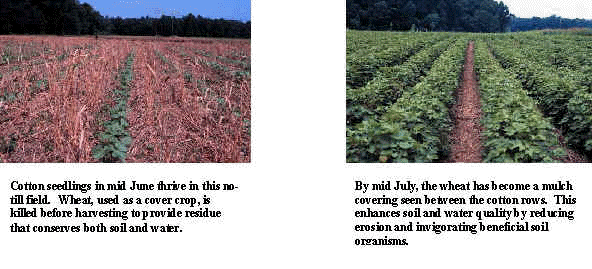CURRENT ONGOING
PROJECTS
Project 2
Project Title: The Center for Environmental Farming Systems
Agency: Department of Agriculture and Consumer Services
Project
Implementation & Completion Date: Ongoing Effort
Project
Description: The Center
for Environmental Farming Systems (CEFS) is dedicated to developing
farming systems that are environmentally, economically, and socially
sustainable. Established in
1994 at the NCDA&CS’s Cherry Farm near Goldsboro, the Center has
over 2,000 acres (1,000 cleared). The
unique center is a partnership of N. C. State, N. C. A&T, NCDA&CS,
non-governmental organizations, other state and federal agencies, farmers,
and citizens. The Center’s activities are organized as follows:
-
Conservation Tillage—Conservation tillage, or
“no-till” farming, has become increasingly popular as a way to reduce
soil erosion, increase organic matter, and enhance soil physical
properties. A long-term
experiment, begun in 1996, includes many major crops in the rotation
(corn, soybeans, cotton, peanuts, and wheat).
Scientists are monitoring yield and economics, soil quality,
nutrients and pesticides in ground water and runoff, and the effect on
wildlife.
- Integrated Farming Systems—Long-term cropping systems that
integrate the broad range of factors involved in agricultural systems are
the focus of this unit. The
USDA has funded the establishment of the start-up phase of a comprehensive
long-term, large-scale experiment. Data
collection and analyses will cover: comprehensive
soil and water quality, pests and predators (weeds, insects, and disease),
crop factors (viability, on/off farm impact, community) and energy issues.
Systems to be compared include a successional ecosystem, plantation
forestry/wood lot, integrated crop/animal production system, organic
production system, and a cash-grain cropping system.
Special attention will be paid to how most effectively and
economically the transition can be made to these alternative systems.
- Organic Farming Systems—Organic production represents the
largest growth segment nationwide in agriculture today. The organic industry is worth $4.5 billion (1998) and has grown at
a rate of 20% per year for the last eight years.
Consumer demand for organic food has increased the need for more
research and education in this area.
With approximately 80 acres certified organic land, the organic
systems unit is the largest land-grant research facility of its kind in
the United States. The site
is used for research and demonstration and serves as a focal point for
student and extension agent training and for annual field days for
farmers.
-
Animal Systems—A new grass-based dairy facility was
recently opened at CEFS. Dairy-related
research will focus on rotational grazing and other herd management
techniques that provide environmentally sound and economical milk
production, while generating an acceptable level of family income and
quality of life. Rotational
grazing is also the focus of a beef cattle demonstration project. Long-term evaluations of these animal systems will include fate of
nutrients in pasture soils, long-term profitability, ground and surface
water quality, and stand life of pasture plantings.
-
Educational Activities—The Center will be hosting many
educational activities for a wide variety of audiences. In addition to annual field days for farmers and extension agent
training, the Center will host an intensive summer internship program in
sustainable agriculture for students from North Carolina and around the
country. Future projects will
expand this educational effort to include elementary and high school
students, teachers, and other interested agricultural professionals.

Contacts:
- Eddie Pitzer, CEFS Superintendent
NCDA&CS
(919) 731-3270
- Dr. Nancy Creamer
Department of Horticultural Science,
NCSU
(919) 515-9447
- John O'Sullivan
Farm Management Specialist, NCCES
NC A&T State University
Greensboro, NC
(336) 334-7957
Anticipated
Environmental Sustainability Benefits: Citizens of North Carolina and other states are currently faced
with landscape-scale issues such as ground and surface water
contamination, soil erosion, declining soil quality, loss of wildlife
habitat, and declining rural communities. Only long-term, large-scale interdisciplinary systems research can
adequately address these issues. The
Center’s location, the Neuse River Basin, provides an excellent
opportunity to evaluate the impact of diverse cropping systems on water
quality. The soil and
environment at the Center are typical of farms bordering other major
coastal plain river systems in the state. One of the goals is to identify farming practices and systems that
will benefit and enhance water quality and the natural resource base in
the state of North Carolina.
|
